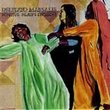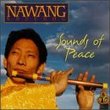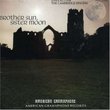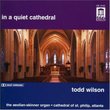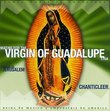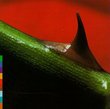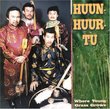| All Artists: Emmanuel Pahud, Mstislav Rostropovich, London Symphony Orchestra, London Voices Title: Gubaidulina - The Canticle of the Sun · Music for Flute Strings and Percussion / Pahud · LSO · London Voices · Rostropovich Members Wishing: 1 Total Copies: 0 Label: EMI Classics Original Release Date: 1/1/2001 Re-Release Date: 10/23/2001 Genre: Classical Styles: Opera & Classical Vocal, Forms & Genres, Concertos, Instruments, Reeds & Winds, Sacred & Religious, Symphonies Number of Discs: 1 SwapaCD Credits: 1 UPCs: 724355715326, 724355715357 |
Search - Emmanuel Pahud, Mstislav Rostropovich, London Symphony Orchestra :: Gubaidulina - The Canticle of the Sun · Music for Flute Strings and Percussion / Pahud · LSO · London Voices · Rostropovich
CD DetailsSimilarly Requested CDs
|
CD ReviewsCello and flute featured in two outstanding works R. Hutchinson | a world ruled by fossil fuels and fossil minds | 08/08/2004 (5 out of 5 stars) "Mstislav Rostropovich on cello and Emmanuel Pahud on flute are the central figures in these two recent works by Sofia Gubaidulina, one of the best composers of our time. "The Canticle of the Sun" (1997) is a religious work which uses the text of the title by St. Francis. The London Voices intone the words reverently, without inflection. As the composer says, "This is the glorification of the Creator and His Creation by a very humble, simple Christian friar. I tried, therefore, to make the choral part very restrained, even secretive and to put all the expression in the hands of the cellist and the percussionists." Rostropovich is certainly expressive, and this is a unique and uniquely powerful 45-minute work, a great example of Gubaidulina's singular vision. "Music for Flute, Strings and Percussion" is a very dramatic work, radically different from "Canticle," with huge menacing tuttis from the orchestra, and bold, loud passages for the flutes of Emmanuel Pahud -- he plays flute, alto flute, bass flute and piccolo. In this 30-minute work, Gubaidulina has divided the orchestra into two halves, one half tuned a quarter-tone lower than the other. These represent light and shadow, yet another device found by Gubaidulina to express her metaphysical vision. "Music for Flute" comes closer to the traditional concerto form than "Canticle," but it is another highly original work. I highly recommend this disc to anyone interested in the music of Sofia Gubaidulina. There are a couple of minor problems with EMI's production that should be noted. First, the tracking was not done correctly. "Canticle" has 11 movements, and "Music for Flute" has 3, for 14 total, but the disc only has 9 tracks. So track 9 includes the last 3 movements of "Canticle" (about 8 minutes worth), and the entirety of "Music for Flute." This is annoying, because it means it is impossible to program either piece separately. I would also like to go on record as saying that EMI's art department should be replaced. This is another terrible cover for an EMI disc, with an atrocious font and the titles splayed in the ugliest possible way, superimposed on a drab background. Worse, there is actually a pile of letters at the bottom of the front of the booklet, and another on the back of the booklet -- whoever thought this was a cutting edge design concept should not be allowed near the production area again. Luckily the music inside this ugly package is radiantly beautiful!" Tremendous works from one of the best C. P. Cooman | Cambridge, MA USA | 11/27/2001 (5 out of 5 stars) "Sofia Gubaidulina is one of the greatest living composers. She makes use of a full range of expressive musical techniques (including unusual means of sound production) for maximum emotional effect and power. Her use of avant-garde elements in her music is always at the service of a unique and extensive musical vision -- never simply for shock value.This disc contains two excellent compositions from the 1990's. The "Canticle of the Sun", a cello concerto (with chorus and percussion instead of orchestra), is a powerful and moving setting of the famous text by St. Francis of Assisi. The colors and mystery evoked throughout are truly stunning."Music for Flute, Strings, and Percussion" is a highly evocative flute concerto, using a double string orchestra (one string group tuned a quarter tone lower than the other) to build impressive edifices of sound.Performances are excellent." Gubaidulina's biggest work of the 90's in definitive perform Christopher Culver | 07/19/2005 (5 out of 5 stars) "This EMI disc contains the world-premiere recordings of two pieces by the profoundly religious Russian-Tatar composer Sofia Gubaidulina. "Canticle to the Sun" is a work for cello, percussion, and choir based on the poem of Francis of Assisi, written for the cellist Mstislav Rostropovich. It is sung here by the London Voices conducted by Ryusuke Numajiri, with the dedicatee on cello. "Music for Flute, Strings, and Percussion" is just that, performed by members of the London Symphony Orchestra with Emmanuel Pahud on various flutes, conducted by Rostropovich.
"Canticle to the Sun" (1997) is one of Gubaidulina's largest works of the 1990s, and is based on a wonderful inspiration. The poem of Francis of Assisi is perhaps the first work of Italian literature and one of the world's all-time great artistic creations. In it the friar, composing in his Umbrian dialect, glorifies God calling as witnesses the sun, the moon, the stars, water, fire, the earth, life, and even death. The cello is the centre of the piece, its music carries the praise of God upwards through ascending notes and underscores the awesomeness of God's power through haunting descents. However, the cellist occasionally gives up his independent role, emulating the percussionists by beating his instrument with a stick, and even joining them when he puts down his bow and plays a bass drum with a rubber ball. Gubaidulina says that, recognising that Francis of Assisi was a humble man, she wrote the choral part such that it would stay in the background, putting most of the expression into the writing for cello. I would say she only partially succeeded. Granted, the reading of the text is humble and simple, but most of the moments of ecstasy in the piece come when the choir sings vocalisations ("ah ah ah"). Do you know the choral moment at the end of her JOHANNES-PASSION after the baritone soloist sings "Svershilos'"? That's the sort of rapture we are occasionally treated to here. This work has been around for less than a decade, but there are already three recordings available. We may take this one as definitive, as Gubaidulina supervised the performance and the cellist who inspired the work performs. The London Voices give a beautifully metaphysical performance, and Rostropovich's cello playing is impeccable. As for the other recordings, on Chandos we find a performance by the Danish National Choir conducted by Stefan Parkman with David Geringas on cello, while on Channel Classics there is a performance by Collegium Vocale Gent conducted by Daniel Reuss with Pieter Wispelwey on cello. Though I do not think their performances of "Canticle" stack up to this one, they are worth seeking out for the other pieces they feature. The Chandos disc has the ghostly a capella "Hommage a Marina Tsvetaeva", while the Channel Classics disc has the "Ten Preludes" for cello and "In Croce" for bayan and cello. "Music for flutes, strings, and percussion" (1994) is a much more difficult work than the highly-accessible "Canticle", but seems greatly rewarding on repeat listens. It is one of Gubaidulina's few works using flute, and here Pahud plays piccolo, flute, alto flute and bass flute. The flute provides most of the expression in the work. The strings, one half of which is tuned a quarter-tone lower than the other for the well-known "light and dark" effect, serve to set up new material for the flutes to reflect upon. The use of the strings in the work is quite reminiscent of the composer's "Seven Words", and if I'm not mistaken there's a quotation here from that work. Percussion is very restrained, totally absent for most of the work. "Music for flutes..." ends with the musicians creating exotic sounds by breating through their instruments. As the cellist joins the percussionists in "Canticle to the Sun", here the strings ultimately approximate themselves to the flautist. In the end, this proves one of the composer's best instrumental works of the 90's, and it is a pity that it is programmed here after a long and demanding piece, meaning most listeners won't have the energy left to appreciate it. The liner notes are a bit odd. There are two biographies of the composer within, the second of which doesn't really add anything new after the first. Then there is the problem that the first issue of the disc had botched track division, where the last part of "Canticle to the Sun" and the first movement of "Music for Strings..." are on the same track. This was corrected in later productions of this disc, but maybe your retailer has held this for a while. The only other complaint I have is that Rostropovich's laboured breathing is audible in "Canticle to the Sun". If you have never heard Gubaidulina's work, "Canticle to the Sun" may be a good introduction, though I think that her symphony "Stimmen ...Verstummen" or her masterpiece JOHANNES-PASSION is even better. "Canticle" is one of her grandest and inventive pieces, and deserves an early place in your exploration of this greatest of contemporary composers." |

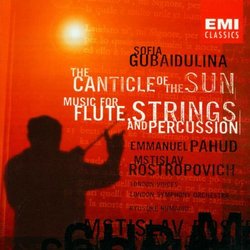
 Track Listings (14) - Disc #1
Track Listings (14) - Disc #1